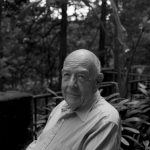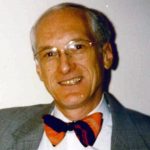Louis Sander: Remembrances and Reflections on His Contributions
by Jeremy P. Nahum, MD
In lieu of abstract here are brief excerpts of the content:
A part of good science is to see what everyone else can see but think what no one else ever said. [Amos Tversky, cited in Lewis, 2017, p. 230]

Louis Sander first became known to me in the mid-seventies, when he and I participated in a workshop at the Boston Psychoanalytic Society, chaired by Evelyn Schwaber, on narcissism and the self. I had recently completed what was a standard psychoanalytic education at the time, with Kohut’s work just beginning to emerge in the consciousness of the psychoanalytic community. Although I was fully engaged in clinical work, my experience was one of cognitive dissonance in analytic discussions, where the richness of the clinical experience butted up against an impoverished, mechanical theory, with no available means of conceptualizing process outside of the rigid constraints of the classical position. The (implicit) theory guiding my action did not fit with the theory handed down. I was left with tension and uncertainty about how to think about what I was doing in the consulting room. At first I did not grasp that Sander was talking about issues central to psychoanalytic practice or theory, that his work was eye-opening for both the clinician and the psychoanalytic theorist. I did not appreciate the significance of his very different language, a language rooted in biology of living systems thinking.
As a way of thinking about what the therapist is doing, perhaps we could say a nonconscious theory is operating and organizing action <…>
Psychoanalytic Inquiry, 39:1, 3-14. February 2019.
This journal issue includes several articles by BPSI members, all of them exploring Louis Sander’s contributions to psychoanalytic theory and his influence on clinicians, theorists, and researchers. Jeremy P. Nahum, MD, was the issue editor and the author of Louis Sander: Remembrances and Reflections on His Contributions, as well as of the Prologue and Epilogue to the issue.
Link to Online Publication [fulltext can be requested from the library]
About the Author:

Jeremy P. Nahum, MD, was the founding member of the Boston Change Process Study Group, and a faculty member of the Boston Psychoanalytic Society and Institute, the Massachusetts Institute of Psychoanalysis, and the Harvard Medical School at the Cambridge Hospital, where he served as a psychiatric consultant to the Family Pathways Project. His other recent publications include Daniel N. Stern, M.D., A Remembrance and, with the BCPSG, Moving Through and Being Moved By: Embodiment in Development and in the Therapeutic Relationship.
Previous Posts:
James M. Herzog (2019). “Polarity, Paradox and the Organizing Process in Development”; Parent-Infant Psychotherapy and Child Analytic Technique: In Honor of Louis Sander. Psychoanalytic Inquiry, 39:1, 98-108.
Lora Heims Tessman, PhD (2019). Momentums of Meeting. Psychoanalytic Inquiry, 39 (1): 88-97.
Jane Hanenberg, EdD (2019). Review of the book Demons in the Consulting Room: Echoes of Genocide, Slavery and Extreme Trauma in Psychoanalytic Practice ed. by Adrienne Harris, Margery Kalb, and Susan Klebanoff. American Imago 76(2), 274-278.
Paola M. Contreras, PsyD (2019). Working with the Human Trafficking Survivor: What Counselors, Psychologists, Social Workers and Medical Professionals Need to Know. In Working with the Human Trafficking Survivor: What Counselors, Psychologists, Social Workers and Medical Professionals Need to Know, edited by Mary C. Burke. Routledge, pp. 61-80.
Rodrigo Barahona, PsyaD (2019). Unlaid Ghosts: A Discussion Of Maria Grazia Oldoini’s “Abusive Relations and Traumatic Development: Marginal Notes on a Clinical Case”. Psychoanalytic Quarterly, 88:2, 277-295.
Sarah L. Lusk, PhD (2019). A Psychoanalytic Approach to the Complexity of Understanding and Treating Patients with ADHD Beyond Childhood: The Experiences of Two Psychoanalytic Candidates. The Psychoanalytic Study of the Child, 72:1, 61-70.
Anthony D. Bram, PhD, ABAP, FABP (2019). The Subjective Impact of Separation and Divorce on a Latency-Aged Child and His Analysis. Psychoanalytic Study of the Child, 72:24-32.
Anna Ornstein, MD (2019). Six Million and One: a documentary. In Cinematic Reflections on the Legacy of the Holocaust: Psychoanalytic Perspectives, edited by Diana Diamond and Bruce Sklarew. Routledge, p. 40-50.
Click here to see a full archive of featured papers. All articles can be requested from the library.

